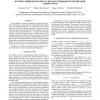Free Online Productivity Tools
i2Speak
i2Symbol
i2OCR
iTex2Img
iWeb2Print
iWeb2Shot
i2Type
iPdf2Split
iPdf2Merge
i2Bopomofo
i2Arabic
i2Style
i2Image
i2PDF
iLatex2Rtf
Sci2ools
105
click to vote
ICASSP
2008
IEEE
2008
IEEE
System combination using auxiliary information for speaker verification
Recent studies in speaker recognition have shown that scorelevel combination of subsystems can yield significant performance gains over individual subsystems. We explore the use of auxiliary information to aid the combination procedure. We propose a modified linear logistic regression procedure that conditions combination weights on the auxiliary information. A regularization procedure is used to control the complexity of the extended model. Several auxiliary features are explored. Results are presented for data from the 2006 NIST speaker recognition evaluation (SRE). When an estimated degree of nonnativeness for the speaker is used as auxiliary information, the proposed combination results in a 15% relative reduction in equal error rate over methods based on standard linear logistic regression, support vector machines, and neural networks.
Auxiliary Information | ICASSP 2008 | Linear Logistic Regression | Signal Processing | Speaker Recognition |
Related Content
| Added | 30 May 2010 |
| Updated | 30 May 2010 |
| Type | Conference |
| Year | 2008 |
| Where | ICASSP |
| Authors | Luciana Ferrer, Martin Graciarena, Argyrios Zymnis, Elizabeth Shriberg |
Comments (0)

